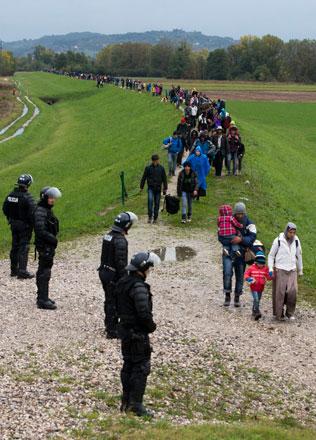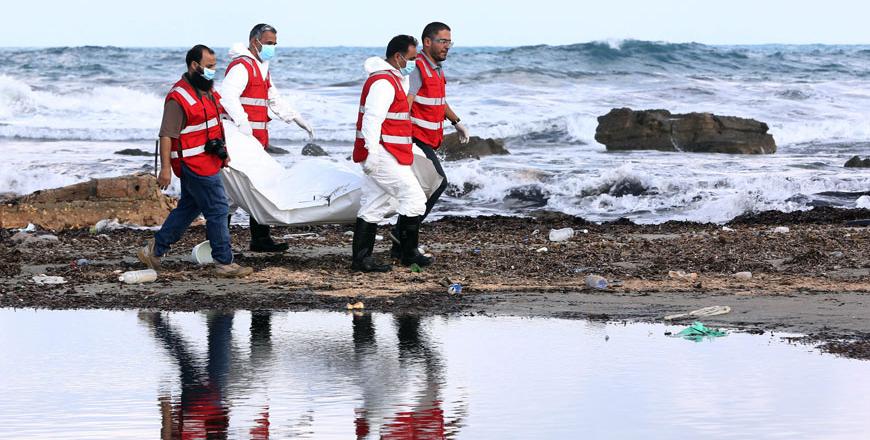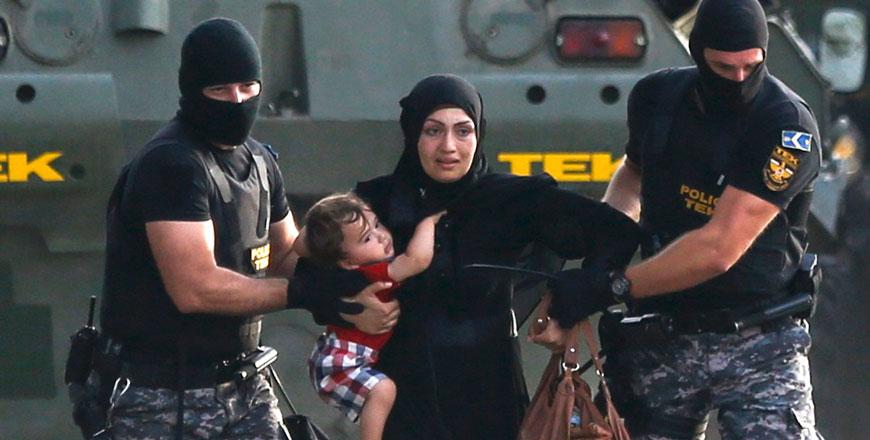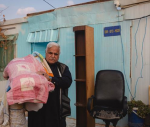You are here
Backlog of migrants swells in the Balkans, tempers fray
By Reuters - Oct 19,2015 - Last updated at Oct 19,2015

Migrants walk past Slovenian police after crossing from Croatia in Brezice on Monday (AP photo)
BERKASOVO, Serbia/LJUBLJANA, Slovenia — The Balkans struggled with a growing backlog of migrants on Monday after Hungary sealed its southern border and Slovenia tried to impose a limit, leaving thousands stranded on cold, wet borders where tempers frayed.
Having declared it would accept only 2,500 per day, Slovenia said 5,000 had arrived from Croatia on Monday, with another 1,200 on their way by train.
"Croatia is ignoring our pleas, our plans," Bostjan Sefic, state secretary at Slovenia's interior ministry, told a news conference, saying the army would be called in to help if such a rate continued.
Attempts by Slovenia to ration the flow since Hungary sealed its border with Croatia at midnight on Friday has triggered a knock-on effect through the Balkans; Croatia began holding back new arrivals and Serbia said it may do the same on its border with Macedonia.
More than 10,000 were stranded in Serbia, the United Nations refugee agency (UNHCR) said, with more on the way but nowhere to go.
"It's like a big river of people, and if you stop the flow, you will have floods somewhere. That's what's happening now," UNHCR spokesman Melita Sunjic said from the Serbia-Croatia border, where about 2,000 people were forced to wait in a muddy, rain-drenched no-man's land.
Groups of migrants fought with each other in the morning, aid workers said, after a night spent under open skies lashed by autumn wind and rain.
"Open the gate, open the gate!" they chanted, their passage barred by lines of Croatian police who erected an improvised fence to control access. Police began letting through one busload an hour.
Slovenia has found itself dragged into the path of the greatest migration of people in Europe since World War II after Hungary sealed its border with Croatia to migrants on Friday.
A country of two million people bordering Hungary, Italy, Austria and Croatia, Slovenia said it would only allow in as many as it could register, accommodate and send on to Austria.
It said Austria had limited its own intake, something Vienna denied. Most refugees want to reach Germany, which for the moment is letting them enter. Slovenia's Sefic said Austria was experiencing "big problems" in handling the numbers and that Germany was accepting fewer.
Ex-Yugoslav relations tested
What initially looked like a smooth and well-coordinated response by fellow ex-Yugoslav republics Slovenia and Croatia quickly broke down into the kind of discord and disarray that has characterised Europe's response to the hundreds of thousands reaching its shores by boat across the Mediterranean and Aegean seas, many of them Syrians fleeing war.
Angry and over-stretched, Croatian police lashed out at journalists on the Berkasovo-Bapska border crossing, hitting a Reuters cameraman and threatening to smash his camera and assaulting and seizing equipment from at least one agency photographer.
Serbia's minister in charge of migration suggested Serbia too may try to stem the flow from Macedonia, proceeding at a rate of around 5,000 per day.
"We have to think about how many people we can take in under such conditions," Aleksandar Vulin told reporters in Berkasovo. "Let's not blame Serbia when the entire EU is turning its gaze from what's happening here."
Hungary's right-wing government says the mainly Muslim migrants pose a threat to Europe's prosperity, security and "Christian values", and has sealed its borders with Serbia and Croatia with a steel fence and new laws that rights groups say deny refugees their right to seek protection.
The European Union has agreed a plan, resisted by Hungary and several other ex-Communist members of the bloc, to share out 120,000 refugees among its members, a small proportion of the 700,000 migrants the International Organisation for Migration projects will reach Europe's borders from the Middle East, Africa and Asia this year.
It is also courting Turkey with the promise of money, easier EU travel for Turks and "re-energised" accession talks if Ankara tries to stem the flow of migrants across its territory.
Meanwhile, relations between the countries of the former Yugoslavia were fraying.
"Yesterday the Croatian side stopped answering our phone calls so we do not know how many migrants to expect, which is making our work very difficult," Slovenian Interior Minister Vesna Gyorkos Znidar told a news conference on Monday.
Her Croatian counterpart, Ranko Ostojic, told reporters in Croatia: "Slovenia first said it could receive up to 8,000 migrants [daily], then 5,000, then 2,500 and now it has been reduced to zero. It would mean that the whole burden is being left to Croatia."
Related Articles
LJUBLJANA, Slovenia — The EU on Wednesday called a mini-summit with Balkan countries on the migrant crisis, as Slovenia became the latest st
BRUSSELS — European leaders lashed out Sunday at each other's handling of the continent's greatest immigration crisis since World War II, ev
SID, Serbia/ROSZKE, Hungary — Riot police fired water cannon and tear gas on Wednesday at migrants demanding to be let through Hungary's new

















